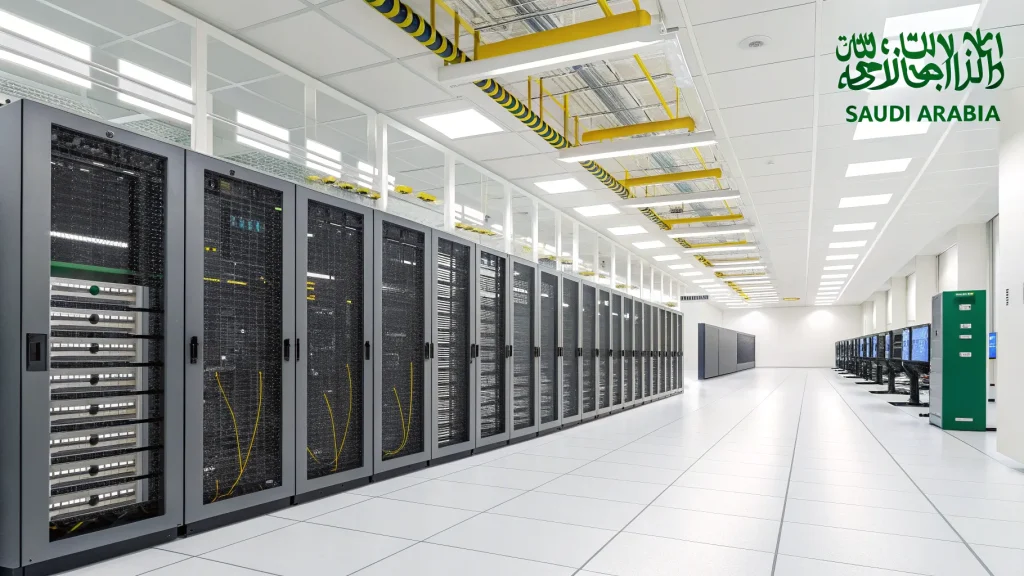NVIDIA and Elon Musk’s xAI plan to anchor a new data center in Saudi Arabia, positioning the Gulf nation as a fresh hub for large-scale AI training. The companies said the facility, equipped with hundreds of thousands of NVIDIA chips, will make xAI the first customer. The move signals a push to secure scarce compute at a global scale, while giving Saudi Arabia a marquee project in its race to build digital infrastructure.
The announcement arrives as AI developers scramble for graphics processing units (GPUs) to train and run next-generation models. Siting the center in Saudi Arabia points to the kingdom’s growing bet on AI as part of its economic diversification plans. It also gives xAI a path to expand capacity for its Grok models as competition heats up.
Table of Contents
ToggleWhat’s Being Built—and Why It Matters
“A data center being built in Saudi Arabia and equipped with hundreds of thousands of NVIDIA chips will count xAI as its first customer,” Nvidia and xAI said.
While neither company shared the exact chip model or delivery timeline, a deployment at this scale signals long-term demand for NVIDIA’s data center lineup. Recent industry rollouts have centered on H100 and H200 GPUs, with customers now eyeing NVIDIA’s B200 and GB200 platforms for larger clusters. The volume described would place the project among the most extensive AI facilities planned anywhere.
For xAI, dedicated capacity could reduce reliance on shared cloud queues and speed model training cycles. The company has been racing to keep pace with OpenAI, Google, and Anthropic. Securing a first-mover slot in a giant new facility suggests a strategy to lock in compute for multiple model generations.
Saudi Arabia’s AI Ambitions
Saudi Arabia has invested heavily in data centers, renewable energy, and submarine cables to attract AI builders. The kingdom’s sovereign wealth fund has backed technology initiatives and launched programs to grow the local computing supply. Officials have pitched the country’s abundant land, energy resources, and capital as advantages for scale-out infrastructure.
A project tied to NVIDIA and xAI gives Riyadh a headline client and a template for other tenants. It also aligns with broader efforts across the Gulf to host AI workloads and research, aiming to shift from oil-driven revenue to digital services.
Energy, Supply Chains, and Risk
Building and operating a GPU megacluster is capital-intensive. Data centers at this size can draw hundreds of megawatts, driving demand for stable power and advanced cooling. Saudi Arabia’s energy mix includes growing solar capacity, though year-round heat challenges thermal design and water use. Operators increasingly favor air-side economization, liquid cooling, and heat reuse to curb costs and emissions.
Supply chains remain tight. Even as NVIDIA increases output, lead times for top-tier GPUs and networking gear can stretch many months. Aligning chip deliveries with construction schedules will be key. Any delays ripple into model roadmaps and cost forecasts.
Strategic Stakes for Nvidia and xAI
Nvidia continues to consolidate its role as the go-to supplier for AI accelerators and networking. A Saudi-based facility deepens the company’s global footprint and helps diversify where the world’s computing resides. For xAI, near-term capacity means faster training, and long-term capacity could support product rollouts across chatbots, developer tools, and enterprise licensing.
- NVIDIA secures demand at a massive scale.
- xAI gains priority access to training compute.
- Saudi Arabia advances its goal to host AI infrastructure.
Some researchers warn that heavy centralization of computing in a few regions can concentrate influence and create single points of failure. Others argue that geographic spread improves resilience and encourages the development of local talent pipelines. Policymakers will watch how data governance, safety practices, and model access are handled under Saudi regulations.
What Comes Next
Key details still to watch include the chip generation, networking architecture, and go-live date. The number of accelerators suggests multi-exaflop training capacity if paired with high-speed interconnects and efficient software stacks. That could power larger multimodal models and faster refresh cycles for xAI’s products.
Regulatory questions may surface around export licenses, security, and data handling. While U.S. controls target shipments to certain countries, approvals and compliance will shape the cadence of deliveries. Energy sourcing and cooling choices will also draw scrutiny from investors focused on sustainability.
The headline is clear: compute is the new oil, and the race to secure it is global. NVIDIA gets another anchor project. xAI gets a bigger engine. Saudi Arabia receives a marquee bet on its digital future. The following milestones—first racks online, first training runs, and first products shipping from the new capacity—will show whether the promise matches the scale.















